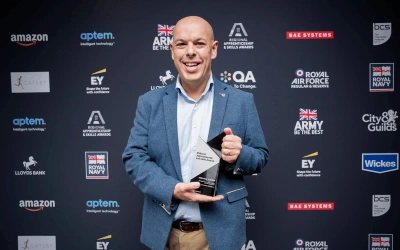With so much noise in the media about women and feminism – from stark, bleak outlooks on our future, to feminism ‘branding’, to old-fashioned objectification, it’s easy to forget that we’re talking about real people’s lived experience. So, as we come to the end of Women’s History Month, I’m going to focus on my personal, human experience which I feel is so often lost or dismissed behind the badge ‘woman’. Hopefully this will help to show that when we talk about driving change and celebrating female achievement, it’s to explore the ingrained culture that affects real men and women – just like myself – every single day. And crucially, to enjoy the vast steps that we’ve taken in the last few decades. Here’s my experience.
As a child
Growing up I went to quite a traditional all-girls school. Outside the standard curriculum, girls did needlework, cooking and netball, while the boys school next door had woodwork lessons and played football. I can’t remember many female role models. The most famous women I recollect at the time were Margaret Thatcher and Anneka Rice. Two very different reasons for their success!
During my education all the top scientists and inventors we learnt about seemed to be men, and I wonder whether this affected my interest in STEM subjects, which I stopped at GCSE. I later went on to complete a degree in Economics, so have always regretted not pursuing maths more.
I was offered a few roles after graduating but didn’t feel passionate about any. I had always been interested in business, but a lack of support made me feel unsure about how to get into the sector. Eventually, I found recruitment, which isn’t a career you talk about in the school playground or at job fairs, even though it offers excellent opportunities!
As a professional
Working in the sales industry for so many years has had its rewards and challenges, especially as the culture has evolved. Once upon a time, the industry was very male-dominated with a lack of women in senior leadership roles but this has really changed over the years – at Lorien we now have a female CEO and Group CEO.
This change may seem subtle, but the result is incredibly refreshing. Stereotypes dictate that men are confident, charismatic, natural leaders – characteristics that go well with sales roles. Women exhibiting similar traits, meanwhile, are often labelled as bossy or emotional. Having women in influential positions helps to disprove these claims and also gives hope to women moving through the ranks. Self-belief, passion and determination are all common traits in the recruiters I see now – male or female.
As a business, I have a lot of faith in Lorien to protect and promote gender equality. Last year we signed the Tech Talent Charter to demonstrate our commitment to improving gender equality in the tech industry and we’re currently working with ‘Empowering You’ who provide learning, development and mentoring to individuals, including their ‘Empowering Women’ stream.
With senior management team support, two years ago, I helped to set up Cohesion, a Lorien-wide initiative focused on improving diversity and inclusion in our own business, with our clients, and in the wider market. We have nominated representatives across all protected characteristics, and I act as champion for women in tech. Last year on International Women’s Day I attended a Northern Powerhouse Consulting event in Leeds with a mixed panel of male and female speakers. This year I attended my annual work conference, celebrating with speeches from our female CEO and an even mix of male and female directors. It feels we’ve come a long way.
As a working parent
I felt a lot of pressure to return to work after having both of my children; I was back to work fulltime after six months with my first and after four months with my second. I did feel quite guilty returning to work; I felt on a knife edge between proving that I was still invested in my role (did you know that 29% of people think men with children are more committed to a job and 46% think women are less committed after children?) and justifying myself to people who thought it was too soon.
I’ve always encouraged my daughters to do well at school and not let our experience as parents put them off certain subjects. I’ve tried to give them role models like Ada Lovelace or Grace Hopper and encourage them to watch films or read books that had strong independent women as the leads. They have also seen their mum have a successful career and show a great work ethic. I recently took my youngest to her first hackathon which she really enjoyed and my eldest daughter is now studying maths at university, so I feel like the effort has paid off.
As a tech recruiter
Technology is one of the industries with the poorest female representation. Women make up only 19% of the workforce, compared to an average of 49% across all UK jobs. This percentage gets even smaller when you factor in race, disability and social economic background. This is a widely discussed topic that will take time, cultural change, outreach to schools, networking, and greater visibility of women in tech to bridge the gap.
As an industry with a bad reputation for female inclusion, there are a lot of businesses out there trying to drive change. Amex, for example, runs programmes in the community, such as Code Girls. Sky is running a Women in Tech Scholars scheme to nurture the next generation of female leaders. KPMG has IT’s Her Future and is a regular at both attending and hosting women in tech events. In the public sector, GCHQ is setting up all-female cyber skills classes in a bid to increase female online security experts (and not a moment too soon, as women make up only 20% of the cyber security market). Meanwhile the BBC will be introducing 600 free places on its all-female CyberFirst Defenders course this spring.
As a recruiter, I’m conscious that I also have a role to play in this changing landscape. Recruiters can help right from the beginning of the process, including aspects of job-design, advert placement, gender neutral language, all the way through to ensuring reasonable adjustment for assessments, giving hiring managers unconscious bias training and using management information to track diversity and inclusion metrics.
As a person
Overall, I think my experience has shaped who I am today. When I look at my daughters, I am incredibly proud of who they are becoming and the female-positive environment that is helping to make that happen. Perhaps that is why I feel so passionately about this. Things like Women’s History Month help to put the spotlight on female experience and improve the future of every young girl in the world.
I’ve included a list of my favourite women in tech inspiration below – I hope you find these useful!
@northpowerwomen: Northern Power Women is a collaborative campaign to accelerate gender diversity from the North of England. Engaging women and men in organisations as ‘agents of change’ for the campaign.
@shedoesdigital: A collective working in the community to showcase amazing digital careers & role models. #1MinuteRoleModel is a great showcase of women e.g. Programme Directors, Digital Designers, Software Developers etc.
@Stemettes: Donna Strickland, the first woman to win a Physics Nobel Prize in 55 years, tells @jimalkhalili how she made the most powerful laser pulses on the planet.
@Innovateheruk: Discover what #STEM companies can do to build a more gender-balanced workforce.
@EmpowerWithTech: Educate, Elevate, and Empower Women in Digital, Technology & Science Founder.







